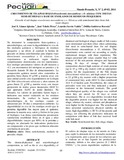Mostrar el registro sencillo del ítem
Crecimiento de tilapias rojas Oreochromis mossambicus x O. niloticus con dietas semi-húmedas a base de ensilados de residuos pesqueros
| dc.rights.license | http://creativecommons.org/licenses/by-nc-sa/3.0/ve/ | |
| dc.contributor.author | Llanes Iglesias, José E. | |
| dc.contributor.author | Toledo Pérez, José | |
| dc.contributor.author | Savón Valdés, Lourdes | |
| dc.contributor.author | Gutiérrez Borroto, Odilia | |
| dc.date.accessioned | 2014-12-10T01:20:33Z | |
| dc.date.available | 2014-12-10T01:20:33Z | |
| dc.date.issued | 2014-12-10T01:20:33Z | |
| dc.identifier.issn | 2343-6174 | |
| dc.identifier.uri | http://www.saber.ula.ve/handle/123456789/39450 | |
| dc.description.abstract | Se determinó la composición físico-química y microbiológica, así como la digestibilidad in vivo de los ensilados químicos y biológicos de residuos pesqueros y su efecto al sustituir la harina de pescado en dietas semi-húmedas para tilapias rojas Oreochromis mossambicus x O. niloticus. Los experimentos se realizaron según diseños completamente aleatorizados con tres repeticiones. Los ensilajes presentaron valores de pH menores a 4.3, con incrementos del nitrógeno no proteico y la licuación durante 30 días de almacenamiento. La composición química mostró altos contenidos de proteína bruta (hasta 43 g/100 g materia seca) con una calidad acorde a los requerimientos de la tilapia del Nilo (Oreochromis niloticus) y altos tenores de grasa (hasta 22 g/100 g materia seca), con mayor proporción de ácidos grasos insaturados (60,0 %) que aportaron 16,8% de ácido linoleico. No obstante, los valores de peróxidos fueron bajos e indicaron una menor oxidación en los residuos fermentados. Se verificó la buena calidad microbiológica de los ensilajes cuando se almacenan por 30 días a temperatura ambiente. La digestibilidad in vivo de los ensilajes reveló que la proteína digestible fue mayor para el químico, mientras la materia seca, calcio y fósforo lo fue para el biológico. Las dietas semi-húmedas presentaron satisfactoria estabilidad física en el agua y altas digestibilidades (mayor que 80%) de la proteína y energía, no afectando los indicadores productivos en comparación a los peces que recibieron alimento con harina de pescado. | es_VE |
| dc.language.iso | es | es_VE |
| dc.rights | info:eu-repo/semantics/openAccess | |
| dc.subject | Dieta semi-húmeda | es_VE |
| dc.subject | Ensilado de pescado | es_VE |
| dc.subject | Tilapia | es_VE |
| dc.title | Crecimiento de tilapias rojas Oreochromis mossambicus x O. niloticus con dietas semi-húmedas a base de ensilados de residuos pesqueros | es_VE |
| dc.title.alternative | Growth of red tilapias oreochromis mossambicus x o. Niloticus with semi-humid diets from fish waste silages | es_VE |
| dc.type | info:eu-repo/semantics/article | |
| dc.description.abstract1 | The chemical-physical and microbiological composition, as well as the in vivo digestibility of chemical and biological silages made of fish wastes were determined and their effect when substituting fish meal in semi-humid diets for red tilapias Oreochromis mossambicus x O. niloticus. The experiments were carried out according to totally randomized designs with three repetitions. The silages presented pH values smaller than 4.3 with increase of the non-protein nitrogen and liquation during 30 days of storage. The chemical composition showed high contents of crude protein (up to 43 g /100 g dry matter) with an appropriate quality for the requirements of the Nile tilapia (Oreochromis niloticus), and high tenors of fat (up to 22 g/100 g dry matter) with a higher proportion of unsaturated fatty acids (60.0 %) that contributed 16.8 % of linoleic acid. Nevertheless, the values of peroxides were low and they indicated a smaller oxidation in the fermented residuals. The good microbiological quality of the silages was verified when they are stored for 30 days at room temperature. The in vivo digestibility revealed that the digestible protein was higher for the chemical silage, whereas dry matter, calcium and phosphorus were higher for the biological one. The semi-humid diets presented satisfactory physical stability in water, high digestibility (> 80 %) of the protein and energy, not affecting the productive indicators in comparison with those of fish that received food with fish meal. | es_VE |
| dc.description.colacion | 69-83 | es_VE |
| dc.identifier.depositolegal | PPI 200502ME4431 | |
| dc.subject.facultad | Núcleo Rafael Rangel (NURR) | es_VE |
| dc.subject.keywords | Semi-humid diet | es_VE |
| dc.subject.keywords | Fish silage | es_VE |
| dc.subject.publicacionelectronica | Revista Mundo Pecuario | |
| dc.subject.seccion | Revista Mundo Pecuario: Artículos | es_VE |
| dc.subject.tipo | Revistas | es_VE |
| dc.type.media | Texto | es_VE |
Ficheros en el ítem
Este ítem aparece en la(s) siguiente(s) colección(ones)
-
Mundo Pecuario - Vol. 010 - Nº 2
Mayo - Agosto 2014


